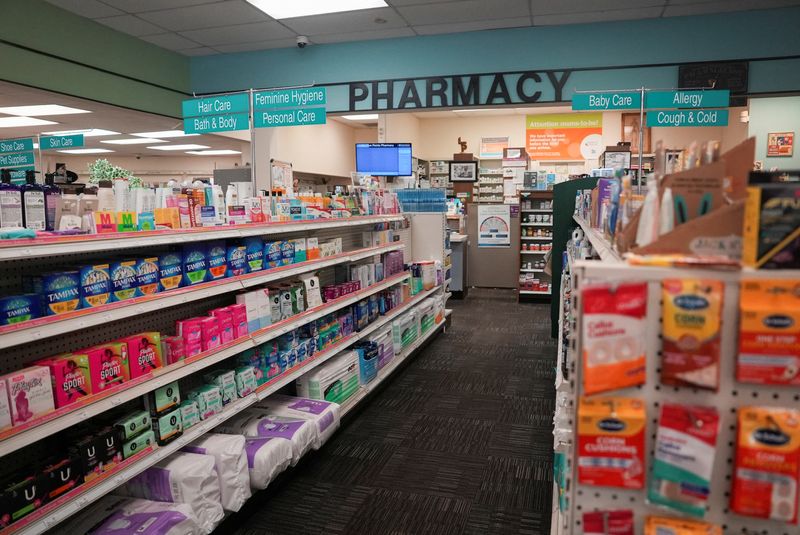
New US COVID guidelines add confusion, complications for Americans seeking shots
By Amina Niasse
NEW YORK (Reuters) -Americans headed to pharmacies for COVID-19 vaccines are running into roadblocks and confusion due to new U.S. guidance that abandoned broad support for the shots, contributing to the lowest vaccination rates since they were introduced.
For the four-week period ended October 3, COVID immunizations were down about 25% nationally, according to IQVIA data in analysts’ research notes.
Steven Thompson, a 41-year-old financial professional from Salt Lake City, routinely gets the COVID shot through employer-sponsored health insurance. In September, he was told at a Walgreens pharmacy he needed a prescription. Utah, Georgia and Louisiana had been requiring prescriptions while awaiting U.S. CDC guidance on who should get the shot.
Thompson’s children’s pediatrician just sent prescriptions to Walgreens. His doctor required a visit.
“I hate going to the doctor or doing any activity where I don’t know how much it’ll cost,” said Thompson, who now doesn’t plan to get a shot unless local infection rates rise.
STATES ADD TO CONFUSION
Utah authorized pharmacists to provide the shot in late September without prescriptions, while Georgia and Louisiana dropped the requirement early this month. A Walgreens spokesperson said patients no longer need a prescription.
Since their mid-pandemic introduction, COVID shots have been recommended for anyone in the U.S. who wanted one. The U.S. Centers for Disease Control and Prevention withdrew that broad support, calling for consultation with a healthcare provider first.
The move came after the FDA approved updated shots only for people aged 65 and over and those at risk of severe disease. The Department of Health and Human Services, which oversees the FDA and CDC, is now led by longtime anti-vaccine campaigner Robert F. Kennedy Jr.
Nadia Hicks, a 31-year-old communications manager from Atlanta, was surprised to learn she needed a prescription to receive the vaccine last month at a Publix pharmacy. Hicks, who has asthma, consulted her doctor for one.
“It’s causing a lot of anxiety because I think the less information we have, the harder it is to know… is it necessary to get the vaccine now?” she said, adding she did not receive the usual immunization notice from her healthcare system.
A Publix spokesperson said its pharmacies can now give COVID shots in Georgia without a prescription.
Health insurers rely on CDC guidelines, informed by recommendations from its outside expert advisers, to set their vaccine coverage terms.
Kennedy gutted that advisory group and replaced it with hand-picked members, many of whom share his controversial vaccine views. As a result, some states said they now questioned the scientific basis for CDC guidance and began setting their own policies. Major insurers have said they will provide coverage for the vaccine through 2026.
“People hear about the FDA, the CDC, their health department; there’s lots of different discussions about what is actually the recommendation,” said Dr. Aaron Milstone, a pediatric infectious disease expert at Johns Hopkins Health System in Baltimore.
US VACCINATION RATES HIGHER THAN OTHER WEALTHY NATIONS
In most European countries, Canada and Australia, COVID vaccine guidance was already limited to older adults and those at high risk of severe COVID.
The midpoint of vaccination rates for adults over 60 in the 21 European Union countries was 8.7% from August 2024 to March 2025, according to the European CDC, well below the 2024 U.S. rate among adults of around 23%, according to CDC data.
COVID hospitalizations continue to present a burden on health systems, said Jodie Guest, an epidemiology professor at Emory University.
“The science shows us very clearly how important these vaccines are to keep you individually safe, but also those around you who are in the very high-risk groups,” she said.
CVS Health Chief Medical Officer Amy Compton-Phillips said in an interview that demand for COVID and flu shots has been lower than last year.
“It’s a little challenging at the moment, because consumers are looking for organizations they can trust,” she said.
The company, which operates one of the nation’s largest pharmacy chains, said it is providing the shots nationwide without a prescription.
Pfizer, with German partner BioNTech, and Moderna make COVID shots based on messenger RNA technology, the safety of which Kennedy and allies have questioned, contrary to scientific evidence. Novavax and French partner Sanofi sell a more traditional vaccine.
The delay in official CDC guidance on updated shots following the FDA’s more limited approval created confusion among consumers and independent pharmacies, which make up about one-third of U.S. pharmacies.
Roger Paganelli, a pharmacist at Mt. Carmel Pharmacy in New York City, said many pharmacists are wary of promoting vaccines for patients not approved by the FDA, and that some worry insurers may refuse to cover them.
Others are concerned they would lose legal protection that shields them from patient lawsuits, said Paganelli, a past president at Pharmacists Society of the State of New York who plans to continue offering the vaccine.
Three pharmacy experts said CDC guidance to consult with patients acts as a barrier to uptake, especially for low-income populations in underserved areas who rely on walk-in immunizations where counseling is impractical.
“As far as the mass clinics, pharmacies are only offering the influenza vaccine,” said Dr. Allison Hill, a director at the American Pharmacists Association, “because over the past weeks we’ve gone back and forth with COVID-19 policy.”
(Reporting by Amina Niasse in New York; Additional reporting by Jayla Whitfield-Anderson in Atlanta, Michael Erman and Michele Gershberg in New York and Julie Steenhuysen in Chicago; Editing by Caroline Humer and Bill Berkrot)
First Appeared on
Source link






